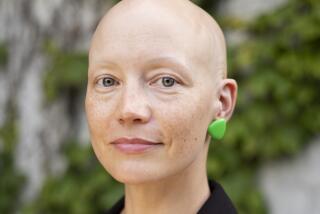BOOK REVIEW : A Scary Mission to Our Brave New World : MINUS TIME <i> By Catherine Bush</i> ; Hyperion $19.45. 256 pages
Sixty years after “Brave New World” and 45 years after “1984,” fictional dystopias continue to be written. The future has narrowed inside them, though; it is all but indistinguishable from the present. If anything, it is behind us and we are caught in it, with no way out.
This notion flickers through the title of Catherine Bush’s novel, though not explicitly. Literally, “Minus Time” refers to the kind of 10-nine-eight countdown used in space launches. Less literally, it refers to the doomsday clock of ecological neglect, the degradation of air, water and biomass and of a human spirit that allows present indulgences to swallow up its children’s destinies.
Bush, a young Canadian, has written a book that seems to be a novel but is closer to an allegory. Its strength is mainly allegorical; as fiction it has an initial liveliness that tends to run down. It lasts long enough, though, to let its message come through to the reader.
Two young people wait by a Florida roadside and watch their astronaut mother being launched into space. Their father has been away for years, organizing help for victims of earthquakes and other natural and human disasters. Mother and father are each “saving” the world in a clean, abstract and socially glorified fashion. The children ache with abandonment, and the world they’re left in is going to hell.
Helen and Paul, sister and brother, are in their early 20s, in fact. Yet their drama--particularly that of Helen, the central character--is abuse by the world-as-parent. Helen and the book come to vivid life when she stands as child-victim. The author’s imagination deflates, and so does Helen, when she gropes toward an adult role.
“Minus Time,” in its flashbacks, tells of brother and sister growing up in Toronto in the emotional absence of two parents wrapped up in rival professional ambitions. Their mother’s space-launch--she is to stay up for a year--follows five years of near-total absorption in training for the mission. Their father has been absent for the same five years on his own shining path of philanthropic self-fulfillment.
Bush gives us a glimpse of the two adolescents coping domestically--Helen is “an expert at thawing-times”--while Barbara, their mother, closets herself in her study. She emerges not to take care of them but to be taken care of. They give her back rubs. When they fight she rages: “I had two of you--you’re supposed to keep each other company.”
To watch the launch, Helen and Paul have rebelled against their official role. Instead of letting the space agency fly them down, they drive. Instead of occupying the official platform, they stand outside with the tourists. It is no use; watching the launch replayed on television later on, they see the camera zero in on a man and two young people whom the announcer describes as Barbara’s family. “Maybe they always keep a family in reserve,” Helen muses. “A backup family, you know, like backup astronauts.”
Back in Toronto, Helen drops out of college, gets a job in a health-food restaurant, drifts. She seeks “a sense of private space in a world where every 90 minutes her mother circled through the sky above her head.” She talks to her on closed-circuit television; Barbara is affectionate but remote, “. . . free, as if she’d jettisoned a life behind her.”
To use space flight as a symbol of the human abandonment of our times is bold, and Bush works it extremely well. There is a naive “Mommy what are you doing up there?” note that manages to make the abstraction absurd and human at the same time. Much less successful is the allegory’s other half. Every day Helen reads of new ecological disasters. There is a toxic seafood epidemic. Chemicals spill in Lake Ontario; the drinking water is temporarily banned.
Helen joins up with a group of ecological activists; its leader becomes her lover. They demonstrate, she is arrested, and news of the arrest irritates the orbiting Barbara. Fireworks celebrating the space mission coincide with a candle-lit procession protesting it. All these things are awkwardly plotted and neither the protesters, nor Helen’s involvement with them, nor her love affair have much besides a rhetorical reality. There is a lot of ordinary newspaper-style arguing. Yet a televised confrontation with Barbara stands out. She berates Helen for not telling her about her activism.
“But you’re not here, you’re in space,” Helen protests.
“I’m in orbit, not on Mars. Helen, I look down all the time.”
“But you’ve left everything down here behind. You escaped.”
Using the tender outlandishness of a child reproaching her space-capsule mother, Bush has found an insidiously compelling way to get under the skin of a disquieting era.
More to Read
Sign up for our Book Club newsletter
Get the latest news, events and more from the Los Angeles Times Book Club, and help us get L.A. reading and talking.
You may occasionally receive promotional content from the Los Angeles Times.







